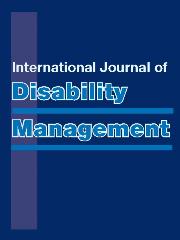Article contents
Exploring Participants’ Views on a Supported Work Internship Program for Autistic and Learning Disabled Young People
Published online by Cambridge University Press: 05 October 2020
Abstract
Individuals with additional needs, such as learning disabilities, face a crisis of unemployment in the United Kingdom (UK). Many of these individuals encounter few adult services that are in place to address their support needs. Supported work internship programs are one attempt to address this crisis. One such program for young people with learning disabilities is the Project SEARCH model. Though a number of research studies have explored the efficacy of the Project SEARCH model, the reported markers of success (e.g., subsequent employment rates) have not taken into account first-hand participant experiences. The current study aimed to establish whether participant views were consistent with the previously reported, positive, quantitative measures. We explored the views of seven interns, aged 17 to 24 years, with various learning difficulties, and three job coaches who were involved in the program from September 2017 to June 2018. Semistructured interviews were conducted and analysed using thematic analysis. Participants revealed meaningful experiences for those involved, positive self-development, and renewed aspirations for the future. The value of a strong and consistent support network involving family members, job coaches, coworkers, and supervisors was highlighted. The study also found ongoing challenges associated with the scheme. These centred on concerns that interns’ abilities were being underestimated, the impact of a reduction/withdrawal of support at the conclusion of the program, and the barriers to finding subsequent competitive employment for interns. The research highlights the value of eliciting participant voice within research, and discusses how the findings can be used to further develop supported work internship programs.
Keywords
- Type
- Article
- Information
- Copyright
- © The Author(s), 2020. Published by Cambridge University Press
References
- 7
- Cited by


